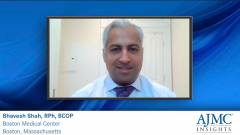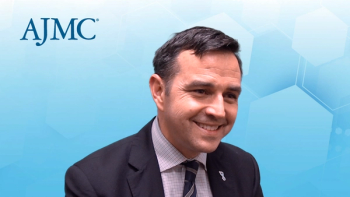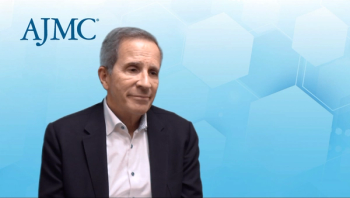
CVD Risk in Prostate Cancer: Future Directions in Care
Closing out their discussion on cardiovascular disease in prostate cancer, experts share their hopes for future evolution of the treatment landscape.
Episodes in this series

Transcript:
Maria Lopes, MD, MS: There’s definitely a huge need for education and for tailoring the appropriate treatment to the appropriate patient. We’re seeing a very rich pipeline in terms of more GNRH agents coming to market, beyond the agonists and antagonists that are oral, that are safer, and that have some clinically meaningful differentiation. [This includes] lowering cardiovascular [CV] risk, not just for men who have cardiovascular risk factors but for those who don’t, because age is already a risk factor. It’s an exciting time, but it starts with awareness. It starts with education around not just the risk itself but how meaningful the clinical differentiation is and how quickly the progression to the cardiac risk occurs and that degree of clinical differentiation. With safer alternatives within weeks, the curve starts separating in terms of cardiovascular risk reduction. There are alternative treatments and clinical differentiation, but we also have to highlight the unmet need through education, better risk-assessment tools, and shared decision support for providers and for patients and also for payers, so we understand the efficacy but also the safety and the potential implications for total cost of care.
Bhavesh Shah, RPh, BCOP: Historically, there’s not a single oncologist who doesn’t know the cardiovascular risk associated with patients with prostate cancer, with the therapies we give them. But we’ve seen historically that there’s conflicting evidence in terms of whether there’s an increased risk or it’s the same. [Or when there’s] not structured guidance when you have multiple organizations saying to do this or that. Not having uniform recommendations also brings out the wrong message to providers. There really needs to be this uniform, universal message across disciplines that there’s increased risk and here’s what you need to do. Maybe there are providers who know that there’s an existing cardiovascular risk, especially patients with preexisting cardiovascular risk. What do you do for them? What do you do for these patients besides instilling in them the fear of God that they’re going develop a cardiovascular event and they need to diet, they need to exercise, they need to stop smoking—all these lifestyle modifications. There are other interventions: is there room for using a drug that has a lower cardiotoxicity or lower cardiovascular-event concerns for patients with prostate cancer? I truly think that’s done through a randomized control trial or through real-world evidence that helps providers feel more comfortable. It’s not coming from meta-analysis or retrospective post-op analyses. It’s based on validated real-world evidence or randomized control trials.
John L. Fox, MD, MHA: Is it likely in the near future that we’re going to have changes in how we manage prostate cancer with incorporation of cardiovascular risks into the treatment equation? I don’t know what’s going to change that. Until the NCCN [National Comprehensive Cancer Network], or the FDA, or somebody else comes out with a black-box warning that suggests we’re causing harm to patients, and that we should look for alternative strategies that reduce cardiovascular risk, it’s unlikely. It’s unfortunate. Absolutely. But I don’t see payers taking the lead in driving that, especially given the relative paucity of data. We would look to the FDA and the NCCN to take the leadership role in educating providers, medical oncologists, and urologists about CV risk and the relative treatment options that would mitigate that increased risk.
Transcript edited for clarity.
Newsletter
Stay ahead of policy, cost, and value—subscribe to AJMC for expert insights at the intersection of clinical care and health economics.











